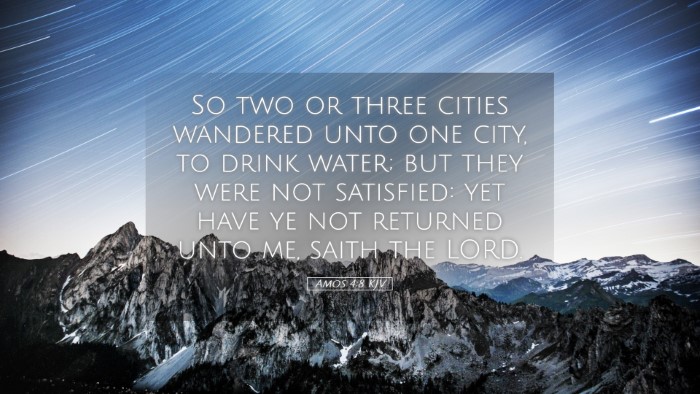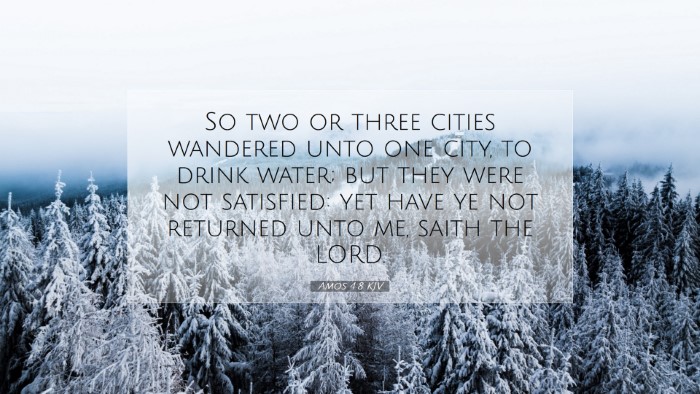Old Testament
Genesis Exodus Leviticus Numbers Deuteronomy Joshua Judges Ruth 1 Samuel 2 Samuel 1 Kings 2 Kings 1 Chronicles 2 Chronicles Ezra Nehemiah Esther Job Psalms Proverbs Ecclesiastes Song of Solomon Isaiah Jeremiah Lamentations Ezekiel Daniel Hosea Joel Amos Obadiah Jonah Micah Nahum Habakkuk Zephaniah Haggai Zechariah MalachiAmos 4:8
Amos 4:8 KJV
So two or three cities wandered unto one city, to drink water; but they were not satisfied: yet have ye not returned unto me, saith the LORD.
Amos 4:8 Bible Commentary
Amos 4:8 - Exegetical Commentary
Amos 4:8 states:
"So two or three cities wandered unto one city, to drink water; but they were not satisfied: yet have ye not returned unto me, saith the Lord."
Introduction
The book of Amos is a profound text that calls for justice and righteousness, primarily set against the backdrop of Israel’s spiritual deterioration. Within this prophetic material, Amos 4:8 serves as a poignant reminder of Israel's unfaithfulness and the consequences thereof. Through this verse, God illustrates the futility of human efforts apart from divine acknowledgement.
Contextual Analysis
This passage occurs in a section where the Lord highlights the unrepentant nature of Israel, despite various afflictions intended to lead them back to Him.
- Historical Context: During Amos's time, the northern kingdom of Israel was experiencing a period of relative prosperity, which fostered complacency and moral decay.
- Literary Context: The verses surrounding Amos 4:8 describe several calamities sent by God as a means of chastening His people, emphasizing their stubbornness in turning back to Him.
Commentary Insights
Matthew Henry's Perspective
Matthew Henry highlights the disappointment of the Lord as His people sought to fulfill their needs through human means rather than seeking Him. He emphasizes that the wandering of the cities symbolizes the scattered state of Israel, where they relentlessly pursued resources but found no satisfaction. Henry underscores that the ultimate implication of this wandering is the need for repentance and returning to God.
Albert Barnes' Exegesis
Albert Barnes expounds upon the phrase "wandered unto one city" as a metaphor for the discontent and desperate search for sustenance. Three cities, representing multiple communities, converge to one in search of water, illustrating a communal urgency driven by deprivation. Barnes notes that despite their convergence and struggle, they remain unfulfilled, illustrating a deeper truth; physical sustenance cannot replace spiritual restoration.
Adam Clarke's Insights
Adam Clarke views Amos 4:8 through a lens of divine judgement and human folly. Clarke notes the irony of Israel's situation: while they congregated in pursuit of water, their spiritual thirst remained unquenched. He emphasizes that the lack of sustenance serves as a clear sign of God’s displeasure, pointing to their failure to heed warnings and return to the Lord. For Clarke, the phrase "yet have ye not returned unto me" resonates deeply with the persistent call of God towards repentance.
Theological Reflection
Theological nuances of Amos 4:8 revolve around themes of divine sovereignty and human accountability. It challenges the notion of self-sufficiency, pushing believers to recognize the futility of relying solely on earthly means for fulfillment.
- Human Effort vs. Divine Intervention: The text underscores that life’s essential needs can only be truly fulfilled through a relationship with God.
- Repentance as a Theme: The repeated call to "return" highlights the gracious nature of God, who desires reconciliation rather than punishment.
Practical Applications
For pastors, students, and theologians, there are several key takeaways from Amos 4:8:
- Call to Action: Recognize the importance of addressing both physical and spiritual needs in ministry.
- Community Reflection: Evaluate the spiritual state of communities; are people desperate for connection but failing to seek God?
- Awareness of Blessings: Acknowledge times when God has called individuals or communities through circumstances to seek Him.
Conclusion
Amos 4:8 serves as a profound reminder of God’s persistent invitation to return to Him amid the noise of human strife and searching. As believers and leaders in the faith community, the challenge remains to engage in earnest reflection and encourage others towards spiritual renewal, recognizing that the true pathways to satisfaction lie firmly anchored in the relationship with the Lord.


